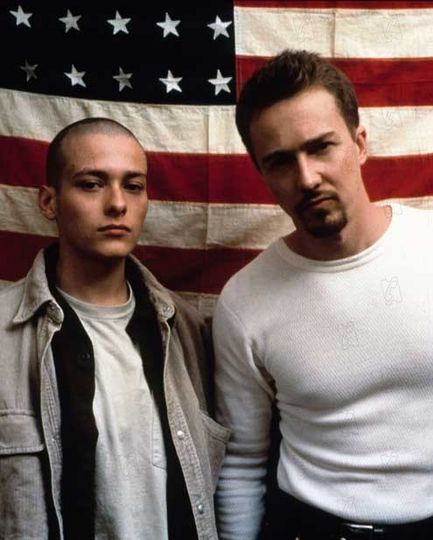Shark Patrol Redux 0003: “Gangs of New York,” “American History X,” and Lessons for a New Year via films from the Past.”
(Blue-stater? Daniel Day-Lewis as "Bill the Butcher" in "Gangs of New York.")
The saying, “Everything old is new again,” is often bright and whimsical, particularly when referring to the reemergence of a happily nostalgic trend. As a devoted fan and follower of popular culture and the arts, I have a unique appreciation for this. Perhaps therein lies the fact that since 7th grade Levi’s corduroys have remained a staple of my wardrobe (and in the right color those babies go with anything!).
I found myself recently amazed as I watched the 2002 Martin Scorsese film, “Gangs of New York” and viewed the plot unfolding in an unexpectedly modern way. All these years after initially seeing what had been presented at the time as the tale of a long-running Catholic-Protestant feud erupting into violence, suddenly it now seemed prescient… and not in a good way.
To give a thumbnail of the plot: “Bill ‘The Butcher’ Cutting,” as played by Daniel Day-Lewis, leads a group of Protestant citizens who call themselves, “The Natives,” against “Priest Vallon” (Liam Neeson, prior to seemingly only taking roles in which he must rescue wrongly abducted innocents) and his immigrant Catholic gang of “Dead Rabbits.” The Priest goes down in full view of his son and the very speaking of the words, “Dead Rabbits” is banned. The film then fast forwards sixteen years to the Priest's son, (Leonardo DiCaprio), “Amsterdam Vallon,” infiltrating the Natives in a long play plot to avenge his father’s death.
If a filmmaker today were to pit the Natives against a group of Muslim immigrants the plot would only need to be slightly modernized. The basic premise still holds water: native-born citizens lashing out against newcomers to their land. Throughout the film the themes of lost jobs, immigrants willing to take lower wages, and of being lesser beings are resounding. “The Butcher,” easily seen as a cruder yet somehow more honorable version of Donald Trump (no heel spurs for this guy, he likes getting his hands dirty), regularly incites his followers (all the while bleeding them dry financially) while insulting anyone different. Sound familiar?
Even those not actively involved see the situation in a thoroughly modern way. While shooting billiards in an upper-class mansion one dandy sniffs to another about the violence in the slovenly “Five Points” section. “Where lies the trouble in paying one half of the poor to kill the other?” he asks. It doesn’t take the imagination of Scorsese to envision one Koch brother addressing his kin with the same query.
“American History X,” on the other hand, seemed revelatory to me of another seemingly unthinkable proposition at the time of its 1998 release. Academy Award nominee, Edward Norton’s “Derek Vineyard” exists obviously, obstinately and proudly beyond accepted societal norms, as do his peers. Their red-laced boots, Fred Perry polos and racist tattoos identify their worldview immediately. Subtlety is not a facet of the late 90’s skinhead movement, if anything not being immediately provocative in appearance is viewed as a sign of weakness or lack of pride.
Not so much today when the man on Pennsylvania Avenue speaks of “good people on both sides” following the Charlottesville riots. While their word view, mindset and ignorance remain essentially - and mind-bogglingly - unchanged you must give the white supremacist miscreants this much: their fashion has evolved just enough to more easily fit in. Khakis, a button-down shirt and New Balance running shoes do nothing to heal a mind damaged by hate, but it certainly does a better job of hiding it than a bomber jacket and shaved head.
"Style is new but the face is the same as it was so long ago," Led Zeppelin's "Heartbreaker" proclaimed and Derek Vinyard's face is spouting cliches directly from the Trump playbook nearly twenty years in advance. His regular referral to other nations "laughing" at American immigration policies seems particularly prescient.
So, everything old is new again, eh? How about a more frightening sentiment as we enter a new year? I’ll step beyond Robert Plant and leave that to a pragmatic former Harvard philosophy professor and graduate of the Boston Latin School, George Santayana:
"Those who cannot remember the past are condemned to repeat it."
Happy New Year.

(Edward Furlong and Edward Norton as brothers, Danny and Derek Vineyard, in 1998's "American History X.")
